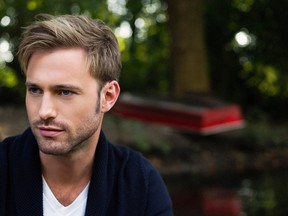Classical: For Benjamin Appl, mixing things up allows him to experiment

Article content
Benjamin Appl, baritone with James Baillieu, piano
When: Sunday May 7, 3 p.m.
Where: Vancouver Playhouse
Tickets and info: vanrecital.com
Early May brings the local debut of the renowned singer Benjamin Appl. With co-recitalist James Bailieu, he will present a program called Nocturne, featuring songs by myriad composers, including Schubert, James MacMillan, Richard Strauss and William Bolcom.
Appl’s voice type is lyric baritone — he can go for very high notes, some very low ones, and everything in between. He was one of the last students of the late Dietrich Fischer-Dieskau, and worked with renowned singer and pedagogue Edith Weins. London is home base, where he teaches at the Guildhall School of Music.
Though celebrated for his art song recitals, Appl does perform opera — under the right circumstances.
“Normally I try to do just one opera per year, to allow time for recitals and so on, but both types of performance feed each other. While it is obviously important to work with great conductors, I think it is essential also to work with living composers. I can, for example, ask why a particular phrase is written that way, and in turn perhaps influence the composer a little on how to use the baritone voice more efficiently.”
One of his plans for the immediate future is about the legacy of Dietrich Fischer-Dieskau.
“I am working on a big project to celebrate the upcoming anniversary of his birth in 1925,” he explained. “This involves a lot of careful study, trying to understand the repertoire he chose at various points in his career, and why. It’s speculation, of course, but carefully prepared speculation, or at least I hope so.
“This is the invisible part of a performer’s life. Hours upon hours of intense study before you step onto the stage, where you try to make it sound effortless.”
Appl is especially committed to outreach with younger audiences.
“I visit schools quite often and sing from my repertoire, but I also ask students to play their own music for me, things they have composed or performed, and then we try to find connections between my art song history and their new ideas. Sometimes we don’t quite communicate, but at other times we really catch fire.”
All song recitals start with a complex series of interconnections: singer and pianist, but also poet and composer.
“All performers have to do homework into the meaning of the texts. I argue that we should view ourselves a little like priests, or doctors. To present the music as perhaps they would deliver a sermon or a diagnosis, in terms the audience can understand, which may open up new thoughts for them.”
Appl’s program here is a kaleidoscope of songs. As if programming a conventional recital isn’t hard enough, creating a program like the one we will be privileged to hear is a task on a whole different level. Appl knows exactly what he’s up to.
“No one today can create a program and a running order as Schumann and Schubert did in their song cycles. They are the masters, who show us what we should aspire to,” he explains.
“I often ponder how things changed completely for art song after the Second World War. Obviously we now have access to the great wealth of recorded performances for inspiration. What is interesting to me is how, for example, preceding a lieder with a cabaret song can give you a different perspective on both works: you have to try the combination many times to see if and how it works.”
There are risks, of course.
“Often audiences say they would prefer a recital of works by one composer, but that robs me of opportunities to experiment and, I hope, to please. Our egos prefer praise, of course, but performers learn very early that you can’t please everyone. You can, however, aspire to convey perspectives that will illuminate the music in unexpected ways that the audience will carry away with them. That’s the big reward.”
Postmedia is committed to maintaining a lively but civil forum for discussion. Please keep comments relevant and respectful. Comments may take up to an hour to appear on the site. You will receive an email if there is a reply to your comment, an update to a thread you follow or if a user you follow comments. Visit our Community Guidelines for more information.